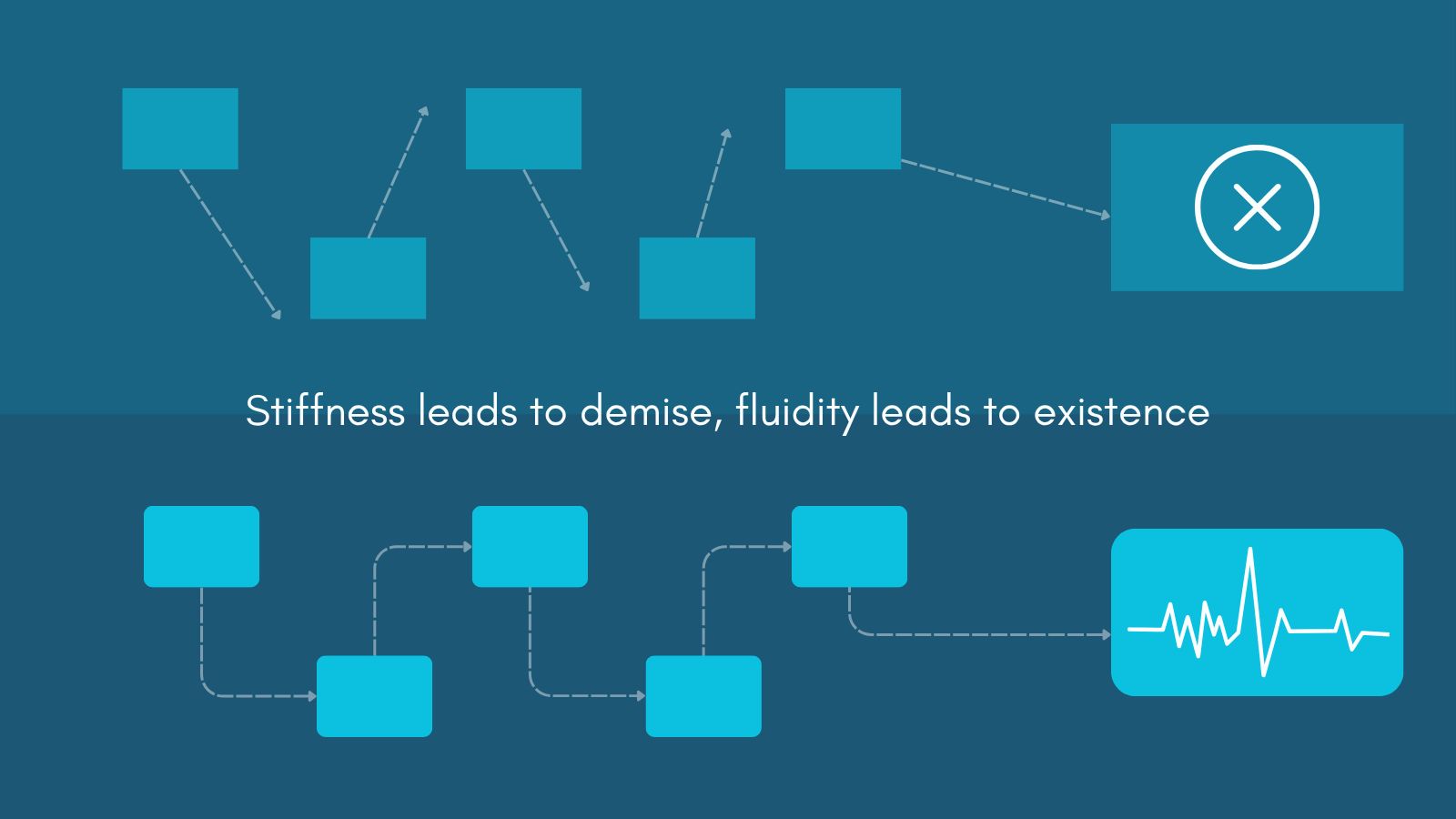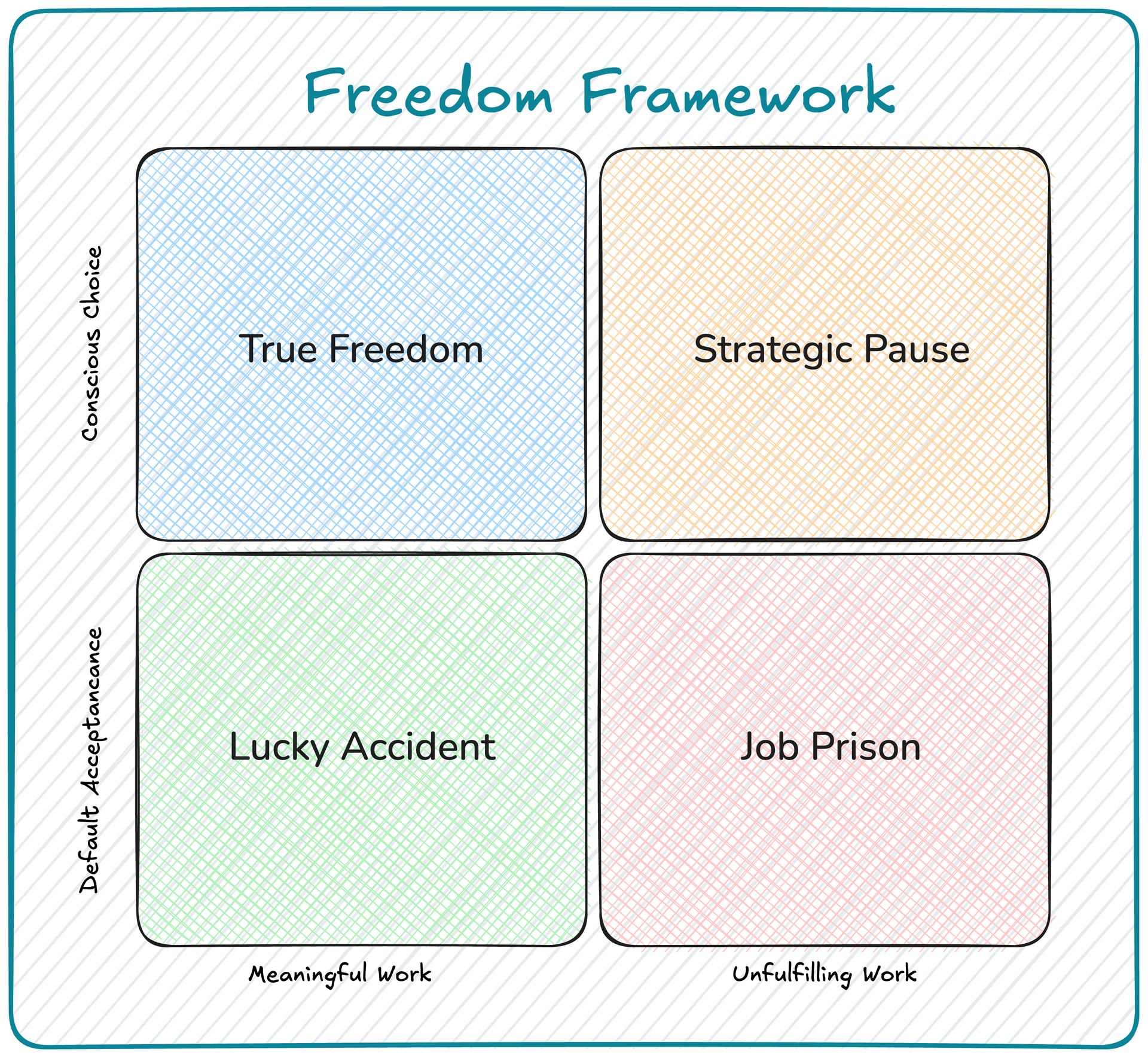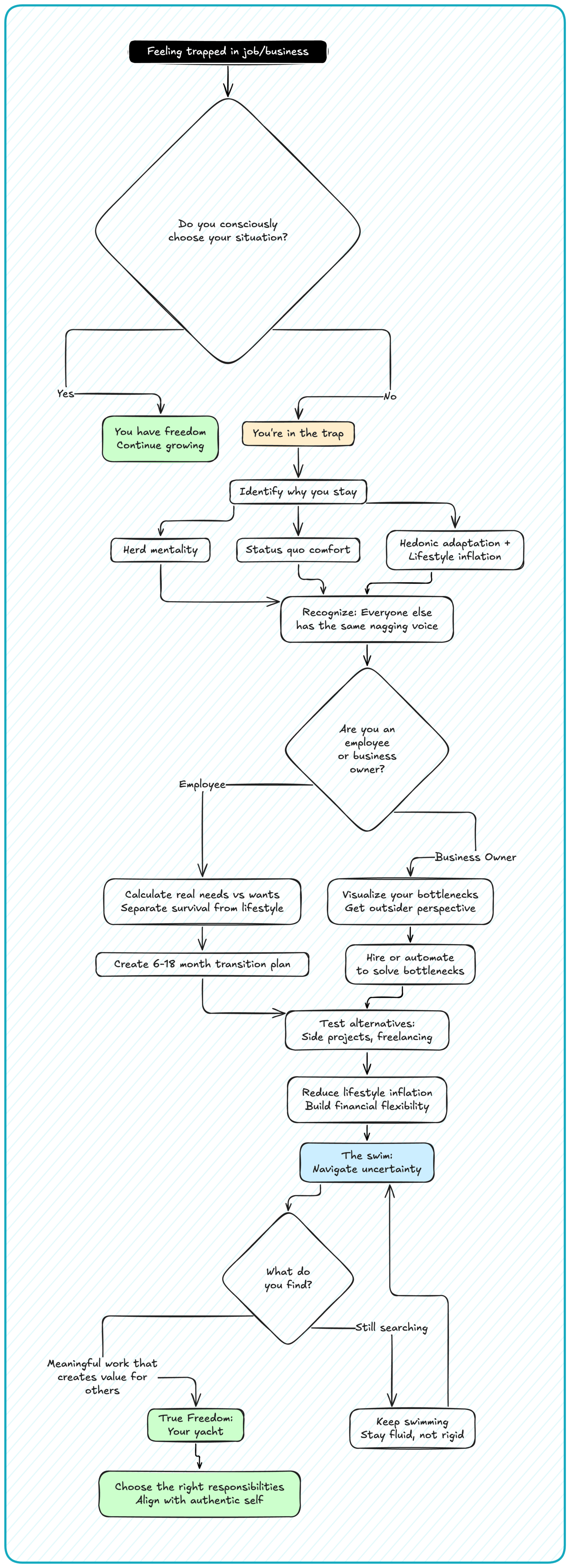- The Operator's AI Playbook
- Posts
- The Freedom Trap That Keeps You Stuck
The Freedom Trap That Keeps You Stuck
I've been thinking about why so many people stay trapped in jobs they hate, and I think I've been looking at this backwards.
The freedom trap we don't talk about
Most people say they want to start a business because they want freedom. But here's what I've realized:
You don't actually want to start a business. You want freedom. And you see starting a business as your path to that.
This might sound like nitpicking, but it's not. It's the difference between chasing a solution and understanding the problem.
I used to think freedom meant escaping the 9-to-5. Now I think freedom means being pleased with what you're doing with all of your time.
Not just happy, flourishing.
Living authentically as who you actually are underneath all the expectations that have been placed on you.
Why we choose comfortable misery
So why do people stay stuck? After four years of running my own business (toward the end where I was beginning to feel a bit stuck) and watching friends wrestle with this same question, I see three patterns:
First, herd mentality.
They look around and see everyone else doing the same thing, so they think they're right. They don't stop to think that everyone around them has the same little nagging voice in their head. Just like them, they aren't voicing it or looking for change.
Often, we're not trapped by circumstances, we're trapped by the stories we tell ourselves about those circumstances.
Second, the status quo is comfortable.
Why rock the boat?
"It's not that bad."
But if you are afraid of doing things that make you uncomfortable, you will never grow. Growth comes in those moments when you want to crawl out of your skin, when you want to give up, when you want to scream in frustration.
Feeling that, pushing through, and coming out on the other side is how you grow.
That’s what my previous business felt like at the beginning. Constant “just figure it out” situations. Everything was new. Then, it got easy. Then, I stopped feeling like “this is how I am meant to spend my time.”
Third, we adapt too well.
We are good at adapting to our life as it is. That's why you've been able to tolerate the status quo for so long. You've adapted to it. Your brain has gotten comfortable with the discomfort.
Here lies a paradox, as the very adaptation that helps us survive can also trap us. We become rigid in our thinking, stuck in patterns that no longer serve us.
Stiffness leads to demise, fluidity leads to existence. - Miyamoto Musashi
When we stop flowing with change and instead calcify around our current circumstances, we begin to die a little each day.

The psychology behind why we stay
There's actual science behind why people get stuck in jobs they hate. Researchers call it "hedonic adaptation", the tendency for humans to return to a baseline level of happiness despite positive changes in their circumstances.
Here's what happens: You get a promotion or salary increase, and it feels amazing at first. But within months, that new income becomes your normal.
The excitement fades.
You're back to feeling the same level of satisfaction you had before, except now you have higher expenses to match your higher income.
This creates what psychologists call lifestyle inflation, where your spending rises to meet your income, creating financial obligations that make leaving feel impossible.
You've upgraded your life based on your current salary, and now you feel trapped by the very benefits you thought would make you happy.
The result? You're psychologically handcuffed to a job that no longer fulfills you, but leaving would mean downsizing a lifestyle you've grown accustomed to.
The golden handcuffs aren't just about stock options, they're about the life you've built around your paycheck.
The business owner's version of being trapped
Here's what nobody told me: Starting a business doesn't automatically make you free.
If you're already in business and don't feel free, then you need to get out or change something from within. Usually it's that you've had all these unkempt systems build and build and build and now you can't wade through them all.
You find yourself as a customer support specialist rather than a strategic shot caller or a creative mind within your core business function.
If you want more and your business doesn't produce enough value to get it, you are not yet free. If your business becomes something that you no longer want to spend your time doing, you are not free.
This is why the goal isn't just escaping your job, it's creating something that aligns with who you actually are.
You started the business to escape the corporate grind, but now you're trapped in a different kind of prison, one you built yourself.
The visualization method that reveals everything
The easiest way out of that starts with identifying what is consuming all your time that's preventing you from feeling free. If you visualize it, it's easier to quickly see the bottleneck.
Sometimes an outsider perspective is necessary for this.
When you're drowning in tasks, you can't see the forest for the trees.
You need someone to look at your business from 30,000 feet and point out what's obvious to them but invisible to you.
Once you identify the bottleneck, you have two choices to really solve it: hire or automate. Obviously automation is cheaper, but it takes time and mental capacity to learn and implement the method. (Or you could hire someone to do this at 1/20th of the cost of what another employee would cost you.)
A practical framework for escape
Most successful transitions happen gradually, not overnight.
The people who successfully break free from golden handcuffs follow a pattern. They don't just quit dramatically with absolutely no idea what’s next. Instead, they build a bridge while they're still walking on it.
Step 1: Calculate your real needs. Write down your actual monthly expenses, then separate needs from wants. You might discover you need 30-40% less than you think. This isn't about living like a monk, it's about understanding the difference between your lifestyle and your survival.
Step 2: Create transition timeline. Most career transitions take 6-18 months of planning. Not because the change is hard, but because doing it right requires building skills, networks, and financial cushions while you're still employed.
Step 3: Test before you leap. Start a side project. Learn something relentlessly and find a unique angle to apply it. Take on freelance work. Build something small that generates income. This isn't about replacing your salary immediately, it's about proving to yourself that you can create value outside your current role.
Step 4: Reduce lifestyle inflation gradually. As you build alternative income streams, resist the urge to increase spending. You're creating financial flexibility that will make the final jump less terrifying.
When staying is the right choice
Let me be clear: Not everyone needs to leave their job to find freedom
Some people genuinely thrive in traditional employment.
They find meaning in their work, enjoy the structure, and value the security.
The key is conscious choice versus default acceptance.
If you're staying because you've thoughtfully evaluated your options and decided this path aligns with your values, that's freedom. If you're staying because you're afraid to examine other possibilities, that's not.
Ask yourself: Are you choosing your current situation, or is it choosing you?
The difference between these two states is everything.

The boat you don't want to be in
Here's how I think about it now: Most people are rowing a boat they don't want to be in. They know how to row, they've been doing it for years. But they're miserable.
If you are not finding meaning in rowing your boat, you need to jump out of it.
You know how to swim, or if you don't, you can learn.
The biggest reason people don't take the jump is the uncertainty around how long they'll have to swim. It's unpredictable (such is life). But you need to believe in yourself and jump.
You can swim and tread water, and eventually you'll wind up on another boat.
Maybe it's a yacht instead of your old rowboat. Now you no longer have to row every day—you just cruise.
And from the deck, you can look back at all of the sea that you crossed. That sea of uncertainty. And you'll have a different view on life.
You'll know that the sea is meant for swimming in, and you won't be as afraid to jump in the next time.
The choice is always yours
A final thought about freedom inspired by David Foster Wallace:
"The really important kind of freedom involves attention and awareness and discipline, and being able truly to care about other people and to sacrifice for them over and over in myriad petty, unsexy ways every day. That is real freedom."
Real freedom isn't about escaping responsibility, it's about choosing the right responsibilities. The ones that align with who you are and create value for others.
Thanks for reading,
James


This will help you organize your mind and bring calm to your business, check it out.

Reply